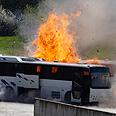
Burgas attack reenactment
צילום: רויטרס
Bulgaria says Hezbollah's role in bus bombing unproven
New Bulgarian government backs down from previous position that Hezbollah is behind attack claiming lives of five Israelis, local driver. Statement complicates British initiative to add Hezbollah to EU terrorist list.
Bulgaria backed down on Wednesday from charges it made a few months ago that Hezbollah was behind a deadly bus bombing on its territory, complicating a British push for the EU to blacklist the militant Shiite Muslim group.
The country's new Socialist-led government said it only had an "indication" that the Lebanese group might have carried the attack that killed five Israeli tourists and their driver in the Black Sea resort of Burgas last year.
Related Stories:
- 7 killed in terror attack on Israeli tourists in Bulgaria
- Watch: Security footage from Burgas blast
- Bulgaria conducts reenactment of Burgas bombing
This alone, Foreign Minister Kristian Vigenin said, did not justify any European Union move to list it as a terrorist group.
"It is important that the (EU) decision be based not only on the bombing in Burgas because I think the evidence we have is not explicit," Vigenin, whose government took office last week, told national state radio BNR.
"There is an indication that it is possible (that Hezbollah was behind it) but we cannot take decisions with important consequences for the EU based on indirect data."
Hezbollah has denied any involvement in the Burgas bombing.
Britain has argued that evidence from Bulgaria - and a jail sentence handed down by a Cypriot court in March to a Hezbollah member accused of plotting to attack Israeli interests – meant the EU should blacklist the group's armed wing.
Several other EU governments are reluctant, saying the EU needs watertight evidence to impose sanctions that could complicate the EU's contacts with Lebanon and add to instability in the Middle East.
Hezbollah is part of a coalition government in Lebanon, and some senior European diplomats warn targeting it could increase turmoil in a country already suffering a spillover of civil war from Syria.
At a meeting to discuss the issue in Brussels on Tuesday, some governments said they were not ready to back Britain and wanted more proof of Hezbollah's involvement in the Burgas attack.
On Wednesday, a British diplomat defended London's push, saying existing evidence from Sofia was sufficient for the EU to act.
"We believe it is appropriate for the EU to designate the military wing of Hezbollah as a terrorist organization," the diplomat said, speaking on condition of anonymity.
In February, the last Bulgarian cabinet, a staunch ally of Washington, urged European governments to take a harder stance towards Hezbollah, after blaming it for the Burgas attack.
The Socialists, then in opposition, accused the center-right government of rushing to implicate Hezbollah without proof and exposing the Balkan country to possible new terrorist attacks.
Blacklisting Hezbollah would mark a major policy reversal for the EU, but the idea has gained some traction in recent weeks because of Hezbollah's growing involvement in the Syrian conflict.
- Receive Ynetnews updates directly to your desktop











